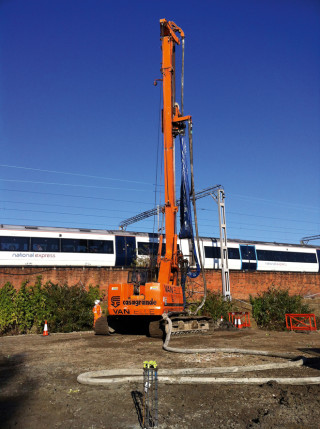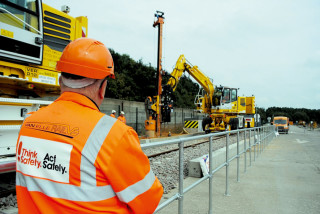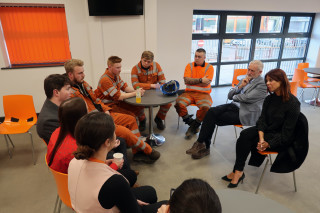Mark Cutler knows what it’s like to try and steer a struggling civil engineering business away from trouble. In 2014, then chief executive of contractor Barhale, Cutler was poached by Balfour Beatty to run its £1.8m-turnover regional contracting business as managing director.
At the time, the business was struggling to work through a number of problem contracts and Balfour’s construction services division was notching up some impressive losses – losing more than three-quarters of a billion pounds in three years, in fact.
Balfour Beatty’s near-death experience is well-documented. But Cutler joined at just the right time, only a few months prior to the arrival of Leo Quinn as group chief executive and the start of Balfour’s recovery. Things could only get better on Cutler’s watch.
In January 2017, he was put in charge of the Balfour Beatty/Vinci joint venture that won £2.8bn-worth of contracts on HS2 in August of that year. But by August 2018 he was on the move again, this time to take over the post of CEO at piling specialist Van Elle from outgoing boss John Fenton.
Van Elle needed someone with Cutler’s turnaround skills. Although a successful business with a strong track record, the company had recently sailed into some distinctly choppy waters.
Van Elle has grown pretty consistently in recent years, but while its turnover figure continued to grow, pre-tax profits fell slightly in the 12 months to May 2017. That period was crucial for Van Elle – indeed the board described it as “transformational” – because in October 2016 Michael Ellis, who founded the business in 1984, floated it on the Alternative Investment Market (AIM).
The idea, of course, was to give Van Elle access to equity capital with which to fuel growth. The directors also said at the time that the floatation brought “enhanced governance and improved discipline”, though subsequent developments tested this statement to the extreme.
Ellis retired in January 2017, although he and his family retained a 20% share of the business. And like many a company founder who decides to float his business, he found it hard to let go. Ellis didn’t like the way the new management was running Van Elle and within a year he – as a major shareholder – was calling for a meeting of other shareholders with the aim of being voted back onto the board.
Ellis laid into the Van Elle management he had put in place to succeed him, saying in a statement to fellow shareholders that the company was going backwards, was unable to forecast future trading and had missed the opportunity to spend some of its £40m flotation receipts on acquisitions.
He also said that his old employees were not being looked after properly by the new regime. Staff morale was low and the Van Elle workforce was not performing as well as it had in his day, declared Ellis – a claim refuted by the board, which cited its enhanced ‘silver’ Investors In People accreditation.
The board accused Ellis of “causing unnecessary and unhelpful ongoing disturbance within the group’s senior management and the wider workforce”.
Ellis responded that, if he were disruptive, he had good reason to be:
“The board of Van Elle accuses me of being disruptive, self-interested and unable to let go. This is untrue. I stress [that] I care deeply about Van Elle and all of its employees and stakeholders…If I am disruptive, it is with cause. I will unashamedly highlight the inadequacy and complacency of the current board since it is in the interests of all shareholders to do so.”
He added: “I worry that morale and motivation is poor and that staff have been damaged by a weak and aloof leadership team. I can reinvigorate the competitive advantage these people give us but only with an understanding and caring management team in place.
He concluded: “In my view, the current board is weak and strategically adrift in an industry they appear not to understand. Only by bolstering this board with executives with a history of success will the company succeed in providing the returns to all shareholders that I know we should expect.”
Somebody must have been paying attention, because in May 2018 – roughly five months after Ellis’ outburst – Cutler was named as Van Elle’s replacement for Fenton, who was leaving for family reasons.
Cutler took up his new role in August and wasted no time in streamlining the business and making key changes to the senior leadership team. The company structure was promptly reduced from eight divisions to five, comprising General Piling (carrying out driven, rotary and CFA piling on open sites), Specialist Piling (focusing on restricted-access and low-headroom work along with ground and slope stabilisation), Housing (offering mini-piling and modular foundation solutions), Rail (specialising in foundation and track-bed work) and Geotechnical Services (trading as Strata, offering geotechnical investigations and testing).
A series of key management changes accompanied the reorganisation. Steve Bursnel, director of the Eastern division, was promoted to group contracts director and Steve Johnson, erstwhile director of the General Piling division (the largest business unit), left the business and was replaced by group construction director David Warner on an interim basis.
Peter Handley, a former Van Elle divisional director who had spent the previous six years at Cementation Skanska, returned to take up the newly-created role of strategy and business improvement director.
John Foster, former commercial director of Saint Gobain-owned Facades & Glazing Solutions UK, was appointed as commercial director with responsibility for all commercial activity in the group as well as business development, estimating and procurement.

Cutler said: “The company has been through a lot of change over the last couple of years but the new strengthened leadership team and streamlined divisional structure allows us to accelerate our improvement, more clearly focus on our customer’s needs and better integrate our specialist capabilities across all the sectors we operate in.”
But while Cutler had been busy knocking the business into shape, the company’s performance had faltered. In January of this year, Van Elle published its financial results for the six months to 31st October 2018, revealing a dive in profits and revenue down almost 20% on the same period the previous year.
The results included a £300,000 charge incurred as a result of Cutler’s restructuring of the business, but the main reason for the slump was a decline in sales. The house-building sector continued to make up the majority (almost 60%) of Van Elle’s revenues but revenue in this sector fell by 17% in the half-year, from £26.3m to £21.8m.
Infrastructure sector sales also decreased, by 23%, to £12.2m (compared to £15.8m in the first half of the year) although sales to the commercial & industrial sector grew very slightly from £8.2m in the first half of 2018 to £8.3m in the second half.
During this period Van Elle also implemented a slow-down in rig fleet expansion, spending only £600,000 compared with £2.7m in the first half. The company sold off five of its piling rigs, fixing the fleet at 119 machines.
“The third quarter has been more challenging than we anticipated, with a disappointing performance in General Piling and several project delays,” commented Cutler.
“As a result, and despite good momentum being carried on from the first half, we don’t believe we will be able to deliver the significant step up in performance during the second half that we anticipated at the time of our trading statement in December 2018.
“These challenges have been frustrating, but it is pleasing to see outlook for the final quarter remaining robust and with a strong pipeline of target projects providing good forward visibility.
“Whilst we are mindful of the wider market environment, we are confident that the initiatives we are taking will develop a strong platform for future strong, profitable growth.”
There’s no doubt that Cutler has taken a bold and unflinching approach to knocking Van Elle back into shape, although the transformation is not yet complete. Last month Van Elle announced that it was looking for a new chief financial officer following the resignation of Paul Pearson, the man who had overseen the company’s IPO in 2016.
And notwithstanding his optimistic assessment of the company’s prospects, Cutler clearly has more work to do at Van Elle. In the past two years the company’s share price has fallen steadily, from a high of 138.4p in January 2017 to a low of 42p in April 2019. And although Van Elle’s share price has seen a modest recovery since May, one analyst recently calculated that the business had a return on equity of 12% - meaning that for every £1 of shareholders’ equity, it generated a profit of 12p. The construction industry average is 17%.
Van Elle’s recent travails are not all the result of poor management – the company took a £1.6m hit when Carillion, a major client, collapsed and bad weather at the beginning of last year also had an effect. On a positive note, Cutler appears to have done all the right things to turn the business around and put it on course for future growth.
But at least one shareholder appears not to share Cutler’s up-beat expectations. Early last month, Michael Ellis halved his shareholding in Van Elle from 20% to 10%.
Commitment to training
Last October Labour party leader Jeremy Corbyn, accompanied by local MP Gloria De Piero, visited the company to perform the official opening of its new training centre at Kirkby-in-Ashfield, Nottinghamshire.
As well as cutting the obligatory ribbon, Corbyn and De Piero took time out to speak to some of the company’s employees. “The workers and apprentices all spoke frankly about the issues affecting their lives, which was really important for us to hear,” commented De Piero. “Listening to the good experiences that Van Elle’s apprentices are having was really interesting and uplifting.”
The new training facility offers a range of core training courses, supported by an outdoor CPCS area and rail test track. Courses are now offered to third-party companies and individuals as well as to Van Elle’s own staff.
Senior group director Mick Mason said: “The training centre is a £1m investment to the company and showcases our commitment to making sure that the training needs of the Van Elle and construction industry’s workforce are met.”
This article was first published in the June 2019 issue of The Construction Index magazine
UK readers can have their own copy of the magazine, in real paper, posted through their letterbox each month by taking out an annual subscription for just £50 a year. Click for details.
Got a story? Email news@theconstructionindex.co.uk






